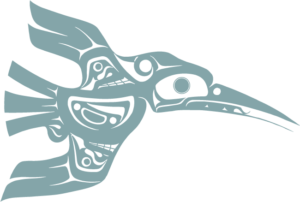NUU-CHAH-NULTH TERRITORY, BC, June 7, 2021 /CNW/ – Since time immemorial, Huu-ay-aht, Ditidaht, and Pacheedaht First Nations have been stewards of the forest, fisheries, and all resources within their ḥahahuułi (traditional territories).
Ditidaht, Pacheedaht and Huu-ay-aht First Nations (CNW Group/Huu-ay-aht First Nations)
On June 4, 2021, the three Nations signed the Hišuk ma c̕awak Declaration to take back their power over their ḥahahuułi. For more than 150 years they have watched as others decided what was best for their lands, water, and people. This declaration brings this practice to an immediate end.
“We have made a commitment to our people to manage the resources on our ḥahahuułi the way our ancestors did – guided by our sacred principles of ʔiisaak (utmost respect), ʔuuʔałuk (taking care of), and Hišuk ma c̕awak (everything is one),” explained Huu-ay-aht Tayii Ḥaw̓ił ƛiišin (Head Hereditary Chief Derek Peters), Ditidaht Chabut Satiixub (Hereditary Chief Paul Tate), and Pacheedaht’s Hereditary Chief Frank Queesto Jones. “We are in a place of reconciliation now and relationships have evolved to include First Nations. It is time for us to learn from the mistakes that have been made and take back our authority over our ḥahahuułi.”
This Declaration acknowledges that three sacred principles are often ignored, and the Nations are the last to benefit from what is taken out of the territory and the last to be asked what must be put back.
The three Nations are already engaged in extensive stewardship efforts on their territories to repair damage done in the past and to plan for future generations, drawing on sound data and information, best practices and science, and as always, guided by traditional values. On Saturday, June 5, 2021, Ditidaht, Huu-ay-aht, and Pacheedaht formally gave notice to the Province of B.C. to defer old-growth logging for two years in the Fairy Creek and the Central Walbran areas while the Nations prepare their plans. This is in addition to the decision of Huu-ay-aht First Nations to defer logging of its treaty lands.
“Our three Nations look forward to building a future based on respectful nation-to-nation relationships with other governments that are informed by Indigenous history, Indigenous knowledge, Indigenous rights, and Indigenous priorities,” said Chief Councillor of the Pacheedaht First Nation Jeff Jones. “We ask that all peoples both Indigenous and non-Indigenous learn and move forward together and that by working together we can realize a future that is fair, just, and equitable.”
The Declaration states that in accordance with the traditional laws and constitutionally protected Aboriginal Title, Aboriginal Rights, and Treaty Rights, the governance and stewardship responsibilities in the ḥahahuułi of the three Nations must be acknowledged and respected. Third parties – whether they are companies, organizations, other governments, or individuals – have no right to speak on behalf of the Nations. Moreover, for third parties to be welcome in their ḥahahuułi, they must respect their governance and stewardship, sacred principles, and right to economically benefit from the resources within the ḥahahuułi.
Pacheedaht, Ditidaht, and Huu-ay-aht have committed to developing and implementing world-class integrated resource management plans. These plans will draw on the teachings of their ancestors, wisdom of elders, input from citizens and valued partners, and the best forestry, fishery, and integrated resource management advice available. The process will be open and transparent, and the leaders of the three nations commit to offering opportunities for input as long as it takes place through the process outlined by the Nations.
“It is our responsibility to take care of our land for future generations – we are the decision makers,” explained Huu-ay-aht Chief Councillor Robert J. Dennis Sr. “We follow the guidance of our elders and citizens to make the decisions we think are right – we are asking others to respect that process and follow our direction on our territory. Our citizens have a constitutionally protected right to manage and benefit from our lands, waters, and resources.”
The Nations ask that while work is underway everyone allow forestry operations in other parts of their Territories, approved by the Nations and the province, to continue without disruption. Anyone who requests permission to enter our ḥahahuułi is welcome provided they conduct themselves in accordance with our sacred principles. That includes safe, peaceful, and lawful protest that does not interfere with legally authorized forestry operations.
The Nations are also engaged in extensive stewardship efforts on our ḥahahuułi to repair damage done during the colonial past and plan a sustainable future for generations to come. They do this work with the sacred principle Hišuk ma c̕awak (Everything is one) in mind. It is this belief that guides their decision making on their ḥahahuułi.
Monumental cedar has always been important to our Nations for its cultural, spiritual, economic, habitat, and biodiversity values. Decisions on monumental cedar protection and forest management must be led by the people who have held the rights and title and looked after this land for thousands of years.
“Everything we need comes from our forests and our marine habitats in our traditional territory,” explained Ditidaht Elected Chief Brian Tate. “It is time for the people who come to our territory to respect that and to recognize the rights we have to what happens in our ḥahahuułi. What we take out must be put back in.”
Leaders of the three Nations, guided by their members and citizens, know that if their authority over their land is acknowledged and respected it will be a win-win for everyone. In time, it will lead to economic opportunities for all and stewardship practices that will heal the lands and water.
For a copy of the Hišuk ma c̕awak Declaration, please follow this link.
Photos and video available on request.
Heather Thomson, Communications Manager, Huu-ay-aht First Nations, 250-720-7776 or [email protected]


